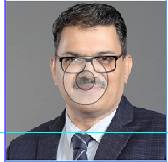Published in Chemical Industry Digest. – May 2024 issue

Rajiv Menon (B. Chem Engg; Master’s in Finance Management) is President & COO – Energy and Industrial, Tata Projects Ltd. He is responsible for businesses such as Power and Metals, Oil Gas, Hydrocarbon, Advanced Technology facilities, Transmission and Distribution and International Business. Prior to Tata Projects, Menon was with Black & Veatch (India) where he was the Managing Director for nearly a decade. He has nearly three decades of rich experience in above mentioned businesses and also in Asset Managment, Sustainability and Emerging Solutions. He has worked extensively across geographies, and has a strong global understanding of business growth accelerators. Tata Projects is one of the fastest growing and most admired Sustainable Technology led Engineering, Procurement and Construction (EPC) companies in India. They have expertise in providing sustainable solutions in the execution of large and complex urban and industrial infrastructure projects while also demonstrating strong presence in refineries, petrochemical and other chemical process plants.
Project engineering and construction are crucial for industrial growth, be it green field projects, expansions or diversifications. Engineering, Procurement and Construction companies, are therefore very important for project set up. Industries like oil & gas, refineries, petrochemicals to all downstream chemicals are seeing major project activities. There are several technologies that have converged in recent times. There are several transformational transitions taking place due to the compulsions of Net Zero. Engineering and construction have also moved gears to adopt new technologies and innovative ways of doing things. Chemical Industry Digest interviewed Rajiv Menon, President & COO – Energy and Industrial Business, of Tata Projects Ltd to understand the engineering and construction sectors in the emerging context, how it is impacted by technologies and how it is moving forward. Tata Projects Ltd is a major player in the Indian EPC sector and Rajiv Menon has three decades of experience in the field.
His views are presented here
Chemical Industry Digest (CID) : In executing projects, primarily two modes are considered: EPC and EPCM. What are the differences, the specific characteristics? Which is better for effective execution? Is Tata Projects Ltd (TPL) an EPC or EPCM company?
Rajiv Menon (RM): EPC stands for Engineering, Procu-rement, and Construction, which is a type of contract used in construction projects where the contractor is responsible for designing, procuring materials, and building the project according to a defined scope and schedule. EPC involves full responsibility of the contractor, including:
- Single Point of Responsibility: The EPC contractor manages all aspects of the project, including design, procurement, and construction. This can simplify project management for the customer, as they deal with one entity.
- Fixed Price Contracts: EPC contracts often come with fixed pricing, providing more cost certainty to the customer.
- Transfer: The EPC contractor assumes more risk, including cost overruns or delays related to design or construction issues.
Whereas EPCM stands for Engineering, Procurement, and Construction Management, where the contractor provides the engineering and management services but does not directly procure or construct the project. Instead, they oversee the project on behalf of the owner, who manages the procurement and construction activities. and construction activities.
The responsibility of contractor includes
- More Control for the Owner: The customer retains more control over procurement and construction activities, which may be beneficial if they have specific vendor preferences or want more transparency.
- Flexibility in Procurement: Allows the owner to directly manage procurement, potentially leading to cost savings or customization opportunities.
- Lower Initial Costs: EPCM contracts may have lower upfront costs, as the owner handles procurement and construction directly.
In summary, EPC can be more beneficial when the customer prefers a streamlined approach with a single contractor responsible for design and construction, while EPCM may be preferred when the customer wants more control over procurement and construction activities or seeks to minimize upfront costs. Ultimately, the choice depends on project complexity, budget, and the customer’s risk tolerance and preferences.
Tata Projects works largely in the EPC space, but we are also comfortable with the EPCM mode. We also work on the Open Book (OB) mode. In OB, the benefits of both modes can be realised: the best time schedules, the best costing, on time delivery by structuring timelines etc. The OB mode has been there for decades, as in the real implementation there is partnership, trust and transparency.
I feel this is the best route to complete a project expeditiously. Otherwise, one goes through a bidding process for six to eight months, and many things are not clear at the outset. I would define the OB mode as an advanced contracting approach, a hybrid model, which is a win-win situation for the client and contractor.
CID: Since in your group there is TCE also in the same line of business i.e. engineering and construction, won’t you be competing against each other?
RM: TCE (Tata Consulting Engineers) and Tata Projects are both companies under the Tata group, but they serve different purposes within the infrastructure and engineering sectors:
Tata Consulting Engineers:
- TCE is primarily an engineering consultancy firm that provides a range of services including feasibility studies, detailed engineering design, project management, and construction supervision.
- TCE specializes in engineering solutions across various sectors such as power, water, infrastructure, chemicals, and industrial plants.
- The company focuses on offering technical expertise and consultancy services to support clients in planning and executing engineering projects.
Tata Projects:
- Tata Projects is a construction and project management company that undertakes the execution of engineering, procurement, and construction (EPC) projects across different sectors.
- Tata Projects is involved in the actual construction and implementation of projects, including civil, mechanical, electrical, and instrumentation works.
- The company handles a wide range of projects, including infrastructure development, power generation and distribution, urban infrastructure, industrial facilities, and more.
TCE provides engineering consultancy services focusing on design and technical support, while Tata Projects specializes in executing EPC projects and construction activities across various sectors. Both companies complement each other within the Tata group’s portfolio by offering different aspects of the project lifecycle, from conception and design to execution and completion.
CID: How do you see the project activity in the oil & gas, refineries, petrochemicals and downstream chemical sectors which are also some of the major target readership areas of Chemical Industry Digest?
RM: Oil & gas, refineries petrochemicals and downstream chemicals have good potential and promise in India, and globally, despite a certain cyclicality in petrochemicals. I foresee many projects happening in the refinery sector with announcements already made by BPCL, HPCL and IOCL. Reliance is again moving forward in petrochemicals with a huge project.
There are also major transitions taking place now: the energy transition, the supply chain transition, and the pressures towards sustainability. This will impact every area of industry and business. Energy transition will propel many of these projects, particularly in the refinery segment integrating with petrochemicals. The oil, gas, and petrochemicals sector in India continues to show promising growth prospects driven by several factors:
- Rising Energy Demand: India’s growing population and increasing industrialization drive higher energy demand. Oil and gas remain primary sources of energy for transportation, manufacturing, and power generation.
- Government Initiatives: The Indian government has been implementing policies to attract investments in the oil and gas sector, including exploration and production activities. Initiatives like the Open Acreage Licensing Policy (OALP) aim to boost domestic oil and gas production.
- Investments in Infrastructure: Significant investments are being made in pipeline infrastructure, LNG terminals, and refining capacity expansion to meet the rising demand for petroleum products and natural gas.
- Focus on Clean Energy: There’s a shift towards cleaner energy sources like natural gas and renewables, which opens up opportunities in the natural gas sector. India aims to increase the share of natural gas in its energy mix to reduce carbon emissions.
- Petrochemical Industry Growth: The petrochemical sector is experiencing robust growth due to increasing demand for polymers, chemicals, and plastics from various industries like packaging, automotive, construction, and consumer goods.
- Attractive Investment Climate: The government’s efforts to improve ease of doing business and attract foreign investments through policy reforms like the Hydrocarbon Exploration and Licensing Policy (HELP) create a conducive environment for the sector.
- Technology Adoption: Adoption of advanced technologies such as enhanced oil recovery techniques, digitization, and automation improves operational efficiency and reduces costs for oil and gas companies.
Despite these promising prospects, challenges such as regulatory complexities, price volatility, environmental concerns, and geopolitical factors can impact the sector’s growth trajectory. However, overall, the Indian oil, gas, and petrochemicals industry presents significant opportunities for investors and businesses looking to participate in India’s energy and chemical sectors.
CID: Do these segments constitute your major revenue earners. How do you go about selecting projects?
RM : While infrastructure is a very important area for us, a considerable portion of my portfolio is from oil & gas, refineries, petrochemicals, chemicals. We have good potential in the metals sector also. We are a little selective in choosing projects, as we are more keen on those with a technological edge to it, which has innovation and sustainability in them. That’s because we feel we are more competent to execute such projects. So technology partnerships play a major role in our working. We associate with leading technology licensing companies in this regard. I would say that our positioning is as a technology driven EPC company rather than just a construction and contracting company.
CID: What about overseas projects? Are they a major focus area for you?
RM : We do many projects overseas, but our mainstay continues to be projects from India. Geographically, we are more focussed on Middle East. We are doing a couple of projects in Abu Dhabi. We are mapping a few other projects in the Middle East depending on how these would shape up and based on possible partnerships there.
CID: What are some of the major advances taken place in engineering, in construction, in project management that have made phenomenal difference to project execution. What are the novel technological innovations/advances you have introduced? Also how have the convergence of many digital technologies bundled up as Industry 4.0, from IIoT to Data Analytics to Virtual Reality, Artificial Intelligence etc impacted EPC?
RM : Technology is evolving very fast and already many of the latest technologies are already in use in engineering and construction. Sustainability is getting embedded at every step. Construction methods have vastly changed. For eg. modular construction helps in prefabricating project components offsite and assem bling it faster at site. For project success, Tata Projects have taken many steps to make phenomenal difference in project execution, right from concept to commissioning:
- 4D BIM and Hybrid Modular Accelerated Cons-truction: Tata Projects integrates modern construction methods and techniques, including 4D Building Information Modelling (BIM) and hybrid modular accelerated construction. 4D BIM facilitates better visualization of project progress over time, while hybrid modular construction expedites project timelines by prefabricating building components off-site and assembling them on-site.
- Dedicated Technological Platform: Tata Projects employs a dedicated technological platform which enables us to get predictable project delivery by streamlining communication, documentation, and workflow management. It also facilitates risk anticipation and mitigation strategies to ensure project success.
- LEED Gold Standards: Tata Projects has demonstrated sustainable construction practices by adhering to LEED Gold Standards set by the Green Building Council. One such example is designing of Sanad Factory, for chip manufacturing, according to these standards, we have shown our commitment to environmental stewardship and energy efficiency.
- Advanced Water Saving Technologies: Tata Projects implements advanced water-saving technologies to achieve a Zero Liquid Discharge (ZLD) system in their projects. These technologies minimize water consumption and ensure responsible water management, aligning with Tata Project’s commitment to sustainable and eco-friendly construction practices.
Tata Projects aims to enhance project efficiency, minimize environmental impact, and deliver high-quality infrastructure solutions that meet the evolving needs of their clients and communities. We are frontrunner in adopting Industry 4.0 technologies to enhance our operations.
- Drones are used for site surveillance, progress measurement, streamlining logistics and improving project efficiency while minimizing risks.
- Virtual Reality (VR) headsets allow stakeholders to remotely visit project sites, reducing costs and improving safety by minimizing physical presence.
In addition to these innovative tools, we have implemented:
- SAP software to integrate all organizational funtions, ensuring operational coherence, efficiency, and transparency.
- Microsoft’s PowerBI and PowerApps to create data analytics dashboards that provide real-time insights and enable strategic decision-making. This fosters a culture of continuous improvement.
CID: You claim to do EPC from a Sustainability, Net-Zero perspective. Could you please elaborate on this, how and in what all areas of project activity, sustainability-oriented solutions come to play?
RM: Tata Projects is committed to sustainability and has outlined its approach towards planet resilience, striving for Net Zero by 2045. This commitment is part of Tata Group’s ‘Project Aalingana’, which aims to embed sustainability into business strategy.
CID: You claim to do EPC from a Sustainability, Net-Zero perspective. Could you please elaborate on this, how and in what all areas of project activity, sustainability-oriented solutions come to play?
RM: Tata Projects is committed to sustainability and has outlined its approach towards planet resilience, striving for Net Zero by 2045. This commitment is part of Tata Group’s ‘Project Aalingana’, which aims to embed sustainability into business strategy.
- Environmental Considerations: Minimizing ecological disruption, implementing waste management practices to reduce environmental footprint, and integrating pollution prevention measures.
- Materials and Resource Management: Carefully selecting materials with minimal environmental impact, promoting recycling and reuse, and implementing measures to reduce waste generation.
- Technology Selection: The use of digital applications like building information modelling (BIM), Internet of Things (IoT), and augmented reality and virtual reality (AR/VR) have improved the operational dynamics and started playing a critical role in overall efficiency. Green technologies, such as renewable energy systems and eco-friendly materials, are increasingly being incorporated into projects.
Tata Projects is aligning its EPC projects with sustainability goals, embracing the vision for a greener, cleaner, and more equitable future. This involves integrating sustainability into every aspect of EPC projects and making technology choices that support these goals.
- Incorporating sustainable design principles that focus on energy efficiency, renewable materials, and low-impact construction techniques. Use eco-friendly building materials that reduce carbon emissions and waste.
- Implementing energy-efficient technologies and practices throughout the project lifecycle, including efficient HVAC systems, LED lighting, and smart building controls to reduce energy consumption.
- Developing strategies to minimize construction waste through recycling and reusing materials. Implement a circular economy approach to maximize resource efficiency.
- Integrating water-saving technologies such as rainwater harvesting, graywater recycling, and efficient irrigation systems to reduce water consumption during construction and operation.
- Conducting lifecycle assessments to evaluate the environmental impact of materials and technologies used in the project, aiming for lower embodied carbon and improved sustainability outcomes.
CID: How do you go about technology selection for a project? Is it from the client’s side or you select?
RM: Technology selection is done in many instances jointly along with the clients. In some instances we offer technology through our association with technology licensors. If the client has selected the technology, then we go along with it and then see how we integrate our engineering with that technology. Apart from sustainable technologies, the EPC exe-cution itself has a huge scope for implementation on sustainability lines. The advantage we have today is that technology licensing companies are already in the energy transition phase and including to embed sustainability. The clients are also aware and insistent on sustainability goals like Net Zero which makes it easier for us. While we tie-up with technology licensors, we have to do the cost benefit analysis as to what gives the best OPEX and CAPEX. We have excellent relationships with technology licensors in all our areas, which is another value differentiator.
CID: Since you have done both public sector and private sector projects do you find the project executions of both different?
RM: Well, I have seen public sector projects also moving as fast or even faster than the private sector because there is a PMC in place, though it may not so be in all cases. It all depends on the detailing and how much you work as a partner. The private sector has better flexibility within the contracting model to be more practical in their decision making as there aren’t restrictions as such, whereas the public sector has to work within a set of boundaries.
CID: What are the major elements that need critical attention and control to expedite any project? And also ensure there are no cost overruns?
RM: In an Engineering, Procurement, and Construction (EPC) project, there are several major elements that require critical attention and control to expedite the project and ensure there are no cost overruns.
These includes:
- Crafting detailed project plans that outline timelines, resources, budgets, and the sequencing of activities. This includes setting milestones and identifying critical paths to ensure project completion within the agreed timelines.
- Allocating the right mix of personnel, equipment, and materials needed to complete the project.
- Implementing a framework to identify and mitigate risks.
- Monitoring and controlling project timelines and budgets to prevent cost overruns.
- Ensuring the project meets the required standards and specifications.
- Understanding and managing the contractual obligations and rights of all parties.
CID: And lastly what would you say is the USP of Tata Projects – the differentiating factor/s over your competitors, that customers should select your company?
RM : Put simply we are ethical and value conscious. We deliver predictable, sustainable projects through innovation and technology. Additionally, we are backed by a trusted name, The Tata Group. We don’t discriminate based on the size of projects. Our portfolio is very wide from power transmission and distribution projects to metals, oil & gas, and chemicals. So, whether it’s as Rs. 200 crore project or Rs. 5000 crore project, our motto is how to execute it well if it makes commercial sense.































